Xiaohongshu in a Business Dilemma: Betting on Hosts, but Popularity Lasts Less Than 10 Days
![]() 08/06 2024
08/06 2024
![]() 515
515

In Xiaohongshu, so-called hosts are 'old wine in new bottles,' similar to traditional live streaming sales and street hawking. They have not become unique transmitters of lifestyles and ideals as platform marketing claims.
Author | Sun Tianyu
Editor | Liu Shanshan
Recently, Xiaohongshu, the 'grass-planting' community, has become the focus of the internet industry, with discussions centered on the new definition of the 'lifestyle e-commerce' + 'host' model.
'What users buy on Xiaohongshu is not just products, but the life they aspire to see and buy from merchants' live streams,' explained Conan, COO of Xiaohongshu, in a dialogue with economist Xue Zhaofeng.
Previously, on July 24-25, Xiaohongshu held the Link E-commerce Partner Conference in Hangzhou, the e-commerce capital, themed 'Hello, Hosts.' Yin Shi, head of e-commerce operations, said that under this business model, merchants with monthly sales exceeding 5 million have grown by 3.5 times in the past year. Meanwhile, the average order value of live streams reached over 400 yuan, with a relatively low return rate of 33% and a repurchase rate of 29%.
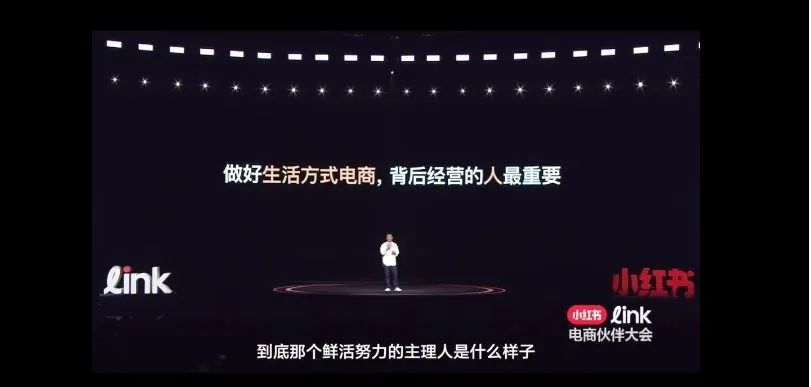
Can betting on the host model truly support Xiaohongshu's long-term commercial transformation and resolve the fundamental contradiction between community content and commercial monetization?
Reality seems less than satisfactory.
01
Hosts' Popularity Lasts Less Than 10 Days?
The host model is the core of Xiaohongshu's lifestyle e-commerce. Directly facing users, hosts showcase their attitudes, lifestyles, and product philosophies through store design and product selection, allowing users to understand not just the products but also the 'people' behind them.
The term 'host' has varying interpretations. The internet defines it as the leaders of trendy brands, typically owners or professional managers.
Simply put, what was once confined to youth subcultures like streetwear, rap, and hip-hop is now widely applied to owners or professional managers of trendy, fashionable, and artistic brands.
Overall, it's more of a formal presentation. Some call Chengdu 'the city of hosts,' while entrepreneurship course providers attempt to summarize hosts' 'four-not-like' traits: 'more stylish than bosses, more approachable than CEOs, more relaxed than supervisors, more romantic than general managers.'
'Jidian Business' observes that Xiaohongshu is striving to strengthen its community culture and content ecosystem through this innovative model, aiming for a unique commercial path.
Xiaohongshu's meticulous planning and construction of the host model is evident in the initial popularity of the topic 'Be a Host of Lifestyle.'
According to Xiaohongshu's data platform 'Xinhong Youshu,' this topic has accumulated 276 million views in a year and a half since its inception in January 2023, showcasing Xiaohongshu's prowess in content innovation and community mobilization while reflecting users' high interest and expectations for new content creators.

Image source: Xinhong Youshu
However, this enthusiasm seems confined within Xiaohongshu's community walls. Even the highly anticipated 'Host Conference' remains a topic discussed internally and in some media reports.
Once external marketing heat subsides, topic engagement and discussion wane rapidly, leaving doubts about the model's sustainability.
During the e-commerce conference, Xiaohongshu successfully pushed the host model into the spotlight through marketing campaigns, with peak participation and views. However, as the conference ended, external attention cooled rapidly, and topic engagement plummeted.
Xinhong Youshu shows that on July 25, during the Host Conference, there were 252 incremental discussions. The next day, only 12, a 95.24% drop. From July 28-29, topic view increments fell from 1.5812 million to 300,500, an 80.99% decline.
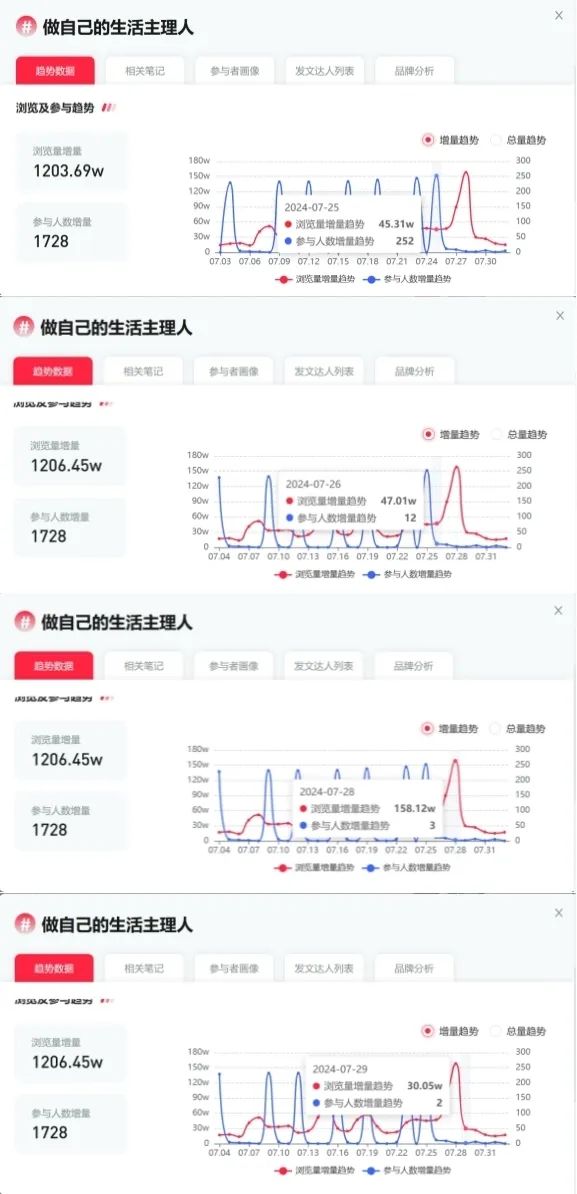
Data source: Xinhong Youshu
Clearly, external attention stems more from platform marketing stimuli than profound recognition of the host model's value. For many users, hosts and KOLs are just new buzzwords.

Data source: Xinhong Youshu
Notably, some newly created niche host topics lack daily view and engagement increments, showing only total views and note increments in the last 30 days, often under 100,000. This suggests low user interest and reluctance to engage, challenging Xiaohongshu's plans to attract creators, deepen its community, and drive commercialization.
02
Hosts Still 'Put Up the Link' in Live Streams
Xiaohongshu bets on hosts as they represent a new business model. Wu Zhenzhong, initiator of the Host Research Institute, predicts at least 100 host brands with over 100 million revenue in the next decade.
New business models need new systems. Hosts must understand branding, community building, product logic, operational pain points, and fan development.
These metrics determine how many fans hosts win over and convince to buy.
Do Xiaohongshu hosts constitute a new business model?
On August 3, at 2 AM, in the live stream of 'Jingyijia,' ranked second on Xiaohongshu's host list, the anchor introduced clothes: 'Only one S size left for this shorts. 39, type 3. Match it with a colorful top. 39, type 3. Two left with padded shoulders. Not 29.9, but 20 yuan. Type 2 if you want it.'
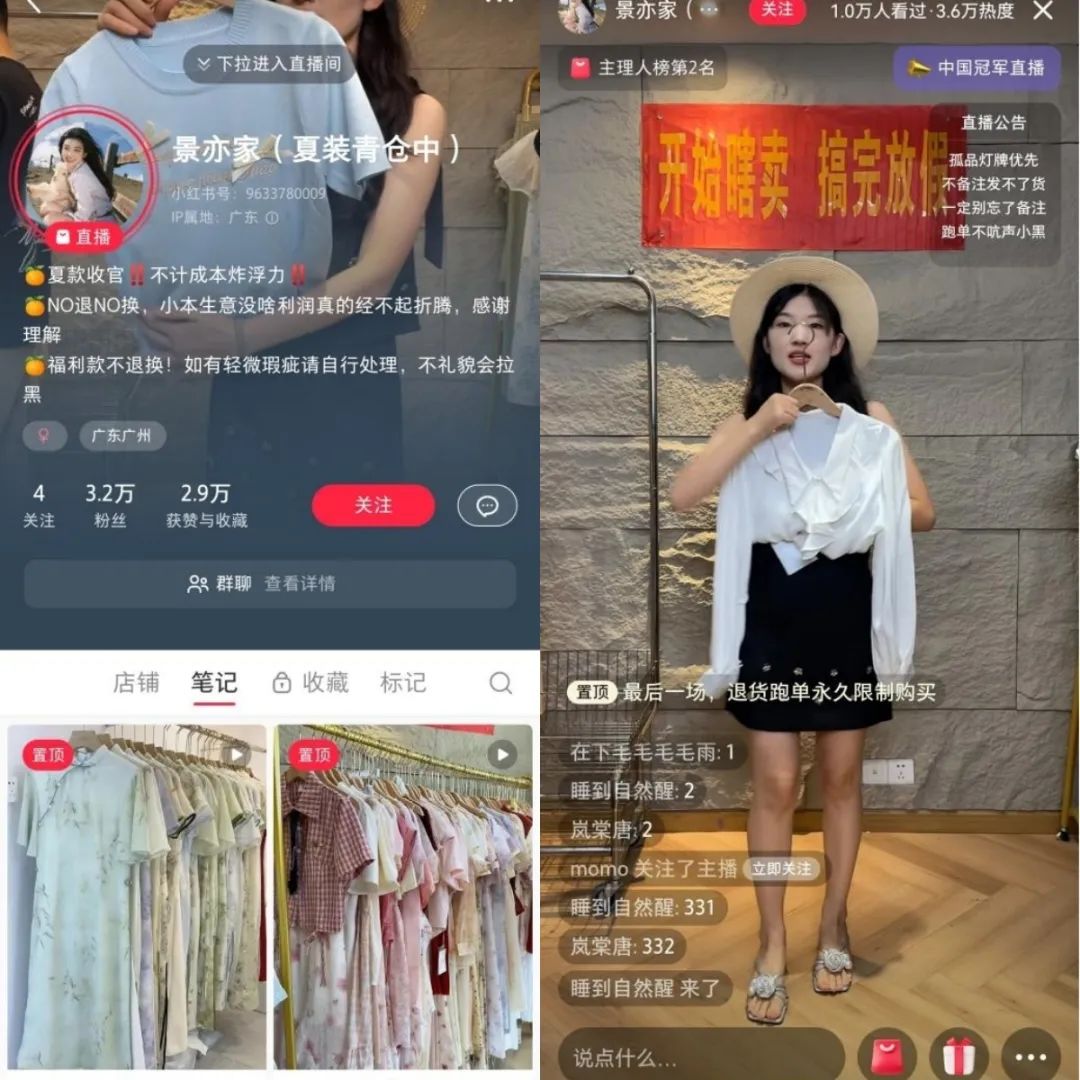
Image source: Xiaohongshu
Each product was shown for less than a minute, with the words 'Start Selling Randomly, Take a Break After' on a red banner. Over 10,000 viewed the incomplete stream.
The previous day, 'Yima Discount Store,' ranked first, sat in a warehouse-like studio, quickly unpacking products and shouting, 'Type 1 for this, type 1.' They dug through cluttered boxes for products to sell.
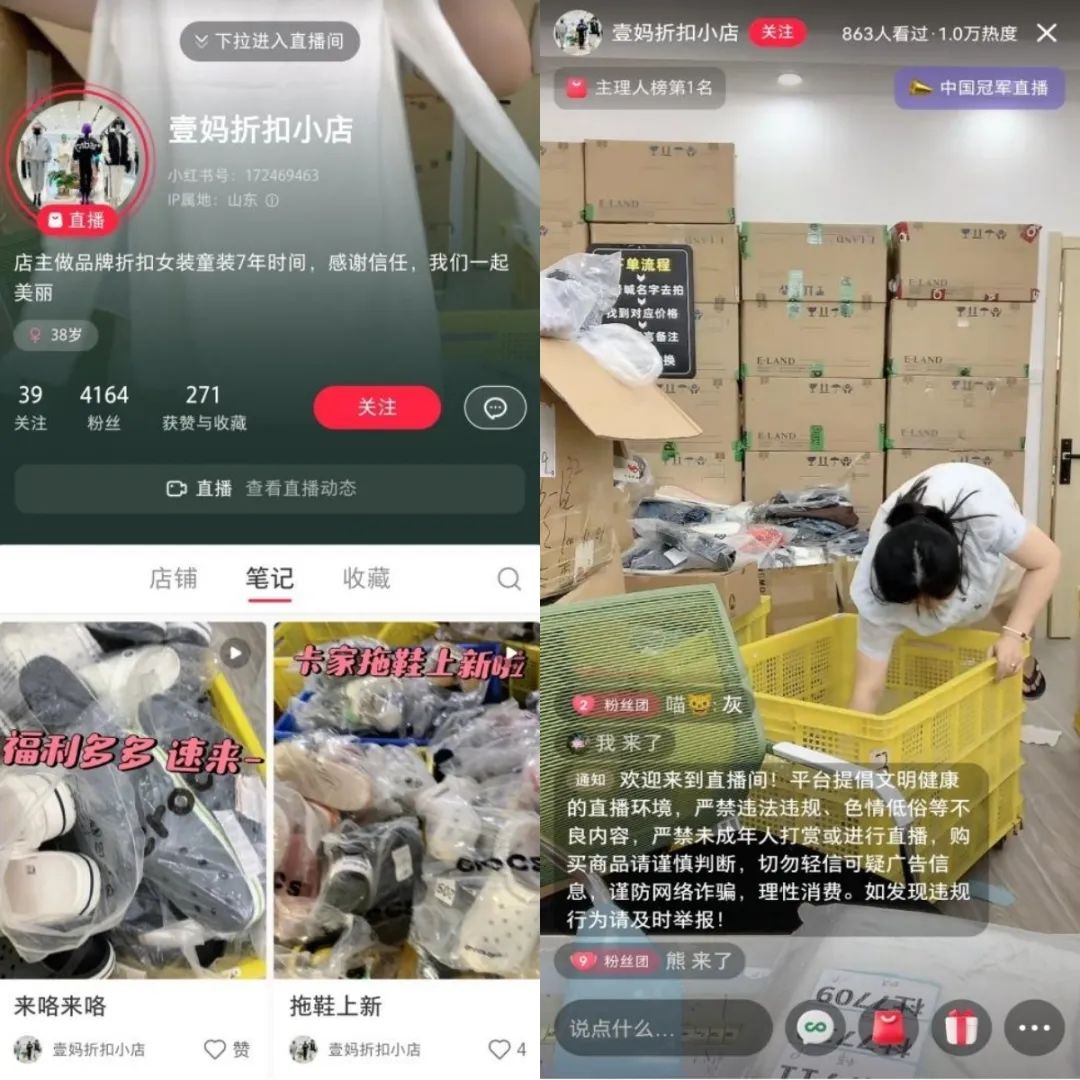
Image source: Xiaohongshu
'Jidian Business' observes that even in Xiaohongshu's 'Focus30 Long-term Operating Host List' streams, '3, 2, 1, put up the link' is frequently heard. Xiaohongshu hosts are active live streaming sellers. Despite large fan bases and sales, they lack innovation in fan development and business models.
To some extent, this resembles traditional live streaming and street hawking. Hosts don't uniquely transmit lifestyles and ideals, as platform marketing claims.
Host live streams are 'old wine in new bottles,' mirroring traditional e-commerce. Anchors quickly showcase products, using low prices as bait, guiding viewers to buy by typing numbers. This converges with traditional e-commerce's 'put up the link' approach.
This disappoints users seeking inspiration on Xiaohongshu, eroding its content community's uniqueness and differentiation. Viewers feel little distinction from other platforms, and excessive content marketing weakens Xiaohongshu's brand as a lifestyle leader.
Xiaohongshu's idealistic host model, as envisioned by Yin Shi and others, is a stage to deeply convey personal lifestyles and ideals through live streams and products. Reality, however, focuses on price competition and quick sales, not lifestyle sharing.
This makes the host model seem like an idealistic, vague vision.
Xiaohongshu stands out among social platforms due to its meticulously built content community, grounded in high-quality content, unique users, and strong community identity, forming a competitive edge.
But if the host model fails to innovate content and differentiate across Xiaohongshu, homogenization will erode its community, losing user interest and belonging, driving them to more personalized platforms. Xiaohongshu's commercial breakthrough may stall within its own community.
03
Missing Closed Loop, Degraded Experience
'Good communities foster good business. Communities and business are not opposed; they coexist, fostering vibrant business ecosystems.'
Conan said his core team debated 'content vs. sharing' in 2018. From a community perspective, he opposed e-commerce. As the community matured and user needs evolved, he saw e-commerce as a potential path for Xiaohongshu.
Lifestyle e-commerce and the host model inject new vitality, but their impact on closing the business loop and enhancing user experience is limited.
Qiangua data shows Xiaohongshu's monthly active users reached 300 million, up 37.6% from 187 million in January 2023. However, daily active users on the mall are less than 20 million, a meager figure compared to its user base.
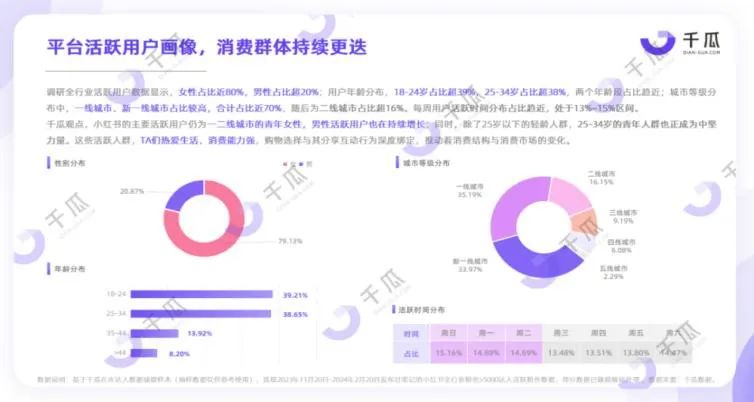
Image source: Qiangua Data
Building trust and clear purchase paths are crucial to converting users. While the host model aims to evoke emotional resonance and spur consumption, it may not significantly impact rational consumers or those seeking value.
Xiaohongshu must improve logistics, after-sales, and supply chain systems to close the e-commerce loop, enhancing user experience and loyalty. The host model offers no solutions to these issues.
Hei Mao Complaints data shows 47,395 Xiaohongshu complaints, mainly about product quality, false shipments, and refund difficulties.
A user bought a DW foundation on Xiaohongshu, noticing significant differences from an official purchase, questioning authenticity. The seller ignored inquiries.
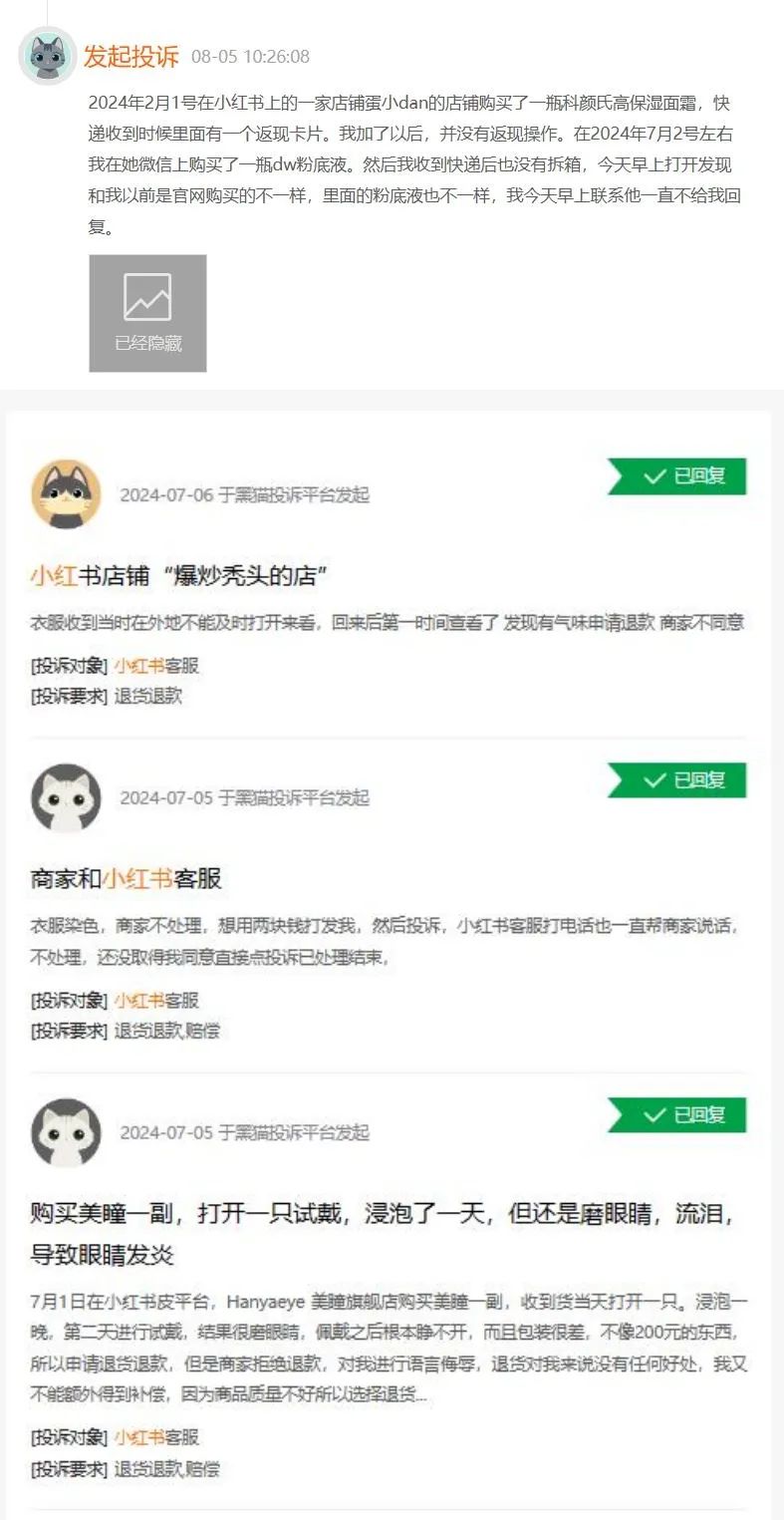
Image source: Hei Mao Consumer Complaint Platform
'I've bought from Xiaohongshu three or four times but won't again. Prices are higher,' said user L, citing price and after-sales as reasons.
On July 2, L bought hair clips from 'Waizai YYDS' with '7-day no-reason returns' and 'instant refunds.' Due to discrepancies, L chose to return them but found no shipping insurance, and shipping costs nearly matched the product price.
'They gave me a coupon, but I'm still angry,' recalled L, frustrated with Xiaohongshu's after-sales process.
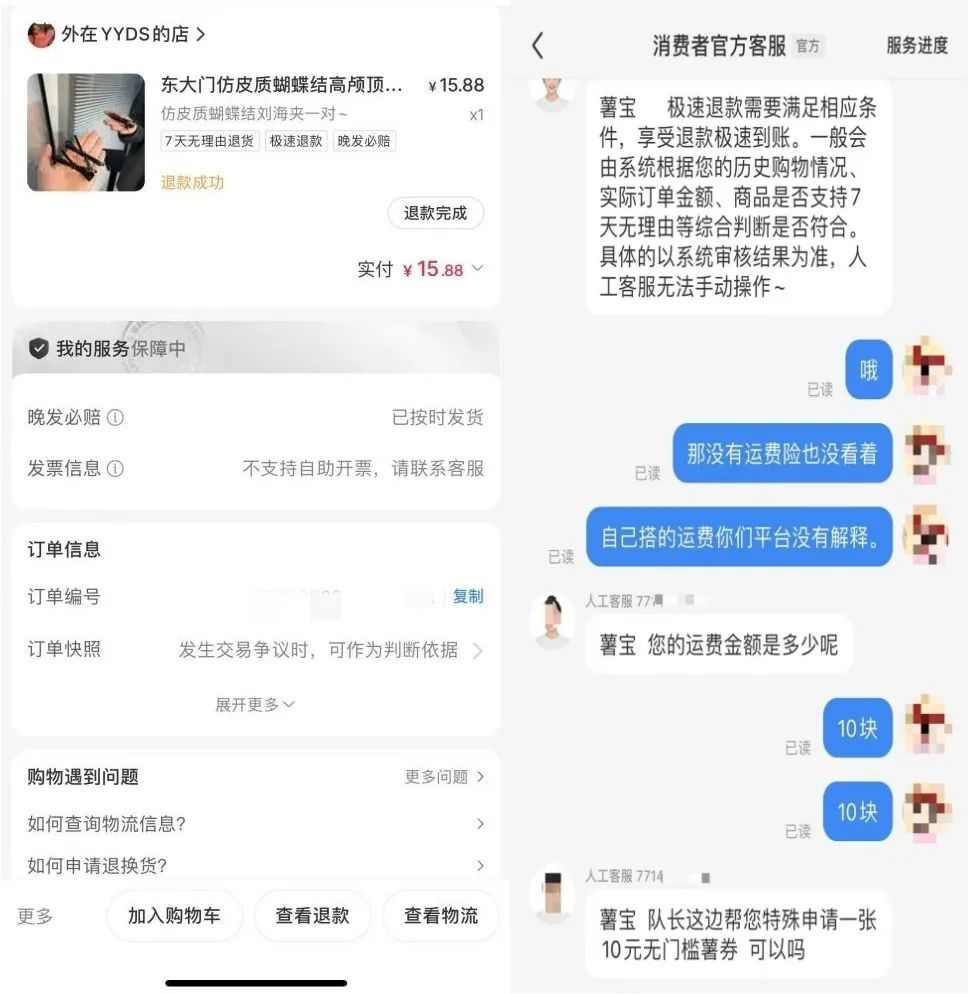
Image source: User-provided
This is not an isolated case. Xiaohongshu's insufficient merchant oversight and consumer protection are evident.
The existence of these pain points not only weakens users' trust in the platform, but also limits the improvement of user purchase conversion rate.
It is worth mentioning that Xiaohongshu's support for settled merchants is also very delicate.
On well-known content platforms, many users recalled their experience of trying to monetize Xiaohongshu. Users are often attracted by the platform's strong subsidies and promotion policies. However, after the first transaction is completed, the store often finds that in order to maintain the community ecology, the platform will limit the traffic of the seeding content and the store, and they return to the starting point of "lack of traffic".
Although this short-term support can stimulate the enthusiasm of stores to a certain extent, it also makes many stores question the sustainability of Xiaohongshu e-commerce.
Whether it is the "lifestyle e-commerce" model or the "host" model, Xiaohongshu needs to listen carefully to the voices of users and understand market demand. When a content community that is carefully nurtured turns into a "traffic monetization pool", users who are skilled at "anti-harvesting" will not simply pay for the nothingness idealism created by others. After the marketing fever fades, Xiaohongshu's real challenge has just begun.
END
Producer: Huang Qiangqiang







